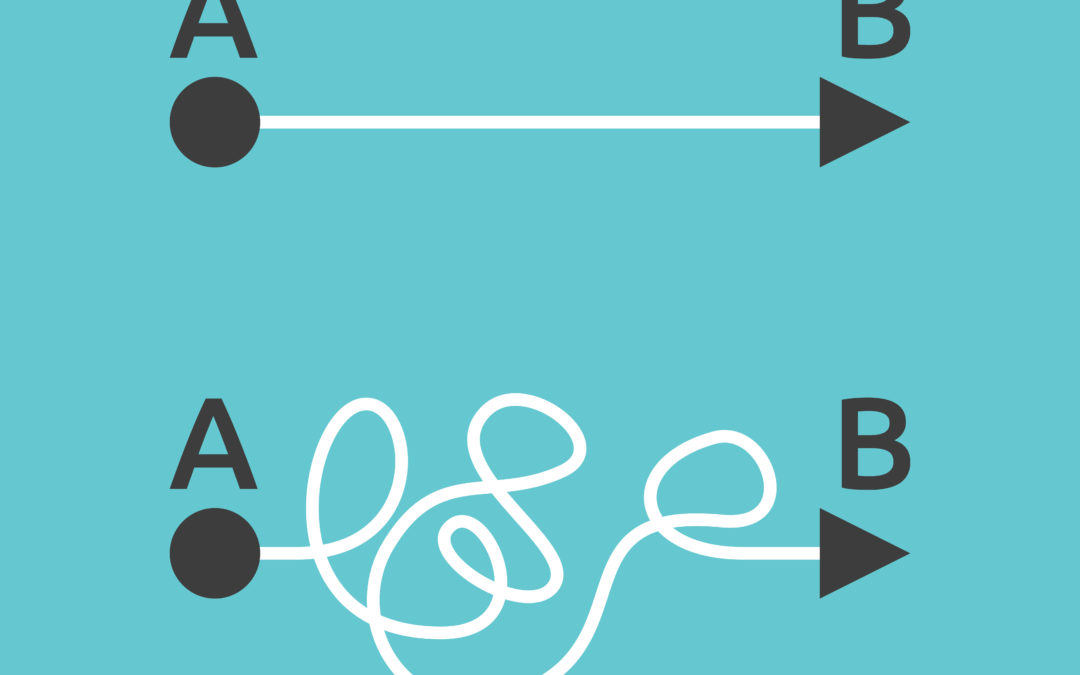by Erica L. Meltzer | Mar 18, 2017 | Blog
Since the SAT changed last year, I’ve been trying to find ways to keep my old SAT materials relevant, and I’m happy to announce that the original version of The Critical Reader may yet live on.
After doing some research, I’ve discovered that the multiple-choice reading portion of the AP English Language and Composition exam is almost identical to Critical Reading on the old SAT. It actually tests fewer concepts, but the concepts it does test are approached in virtually identical ways.
Although the AP test does include some passages that are more challenging than those on the old SAT, the overall level and content (minus the hard science passages) are essentially the same. (more…)

by Erica L. Meltzer | Mar 16, 2017 | Blog, GMAT, The Mental Game
In an attempt to better understand the grammatical issues that students studying for the GMAT typically find most challenging, I’ve started — belatedly, I admit — dipping a toe into the Sentence Correction forums on beatthegmat and gmatclub.
The experience is something I can only describe as a flashback to the days when I used to read students’ obsessive parsing of SAT grammar questions on College Confidential. I don’t dispute that there’s a lot of helpful information, and some really outstanding analysis, but a lot of what I read also makes me want to bury my head in my hands and groan.
To be fair, many of the students posting are not native English speakers, or come from countries where the English spoken is sufficiently different from standard American English that what’s on the GMAT might as well be a foreign language. That’s a huge challenge, and I’m not denying that. (more…)
by Erica L. Meltzer | Mar 8, 2017 | Blog, SAT Essay, Students
If you look at the SAT Essay scoring rubric, you’ll find in order to earn a top score of 4 in “Writing,” an essay must demonstrate “a highly effective use and command of language,” and “a consistent use of precise word choice.”
Those are lovely-sounding directives, but they’re also extremely vague. It’s hard to dispute that these are characteristics of good analytical writing, but what do they actually mean, and how can you put them into practice?It’s easy enough to memorize grammatical rules, but style is something that can’t be taught…right? (more…)

by Erica L. Meltzer | Jan 29, 2017 | Blog, GMAT
When it comes to the GMAT, idiom questions seem to cause a disproportionate amount of anxiety.
To some extent, this is understandable. English is filled with idioms: fixed phrases that, by definition, are what they are for no other reason than that the language evolved a particular way. There is no logical reason that insist on is correct while insist at is not. And for ESL students, the sheer number of these phrases can seem overwhelming.
The reality, however, is that “pure” idioms are simply not that much of a focus on the GMAT. There are, of course, certain idioms that you absolutely need to know; however, the fact that two answers might contain the phrase research on while three others contain research into does not necessarily mean the only way to answer the question is to know which preposition the GMAT considers correct. (more…)
by Erica L. Meltzer | Jan 22, 2017 | Blog
I realize that my 2017 blogging record hasn’t exactly been stellar so far, but I’ve been hard at work on a number of projects.
First, I’m excited to announce that I am collaborating with Larry Krieger (of the original Direct Hits and APUSH Crash Course fame) on a vocabulary book for the new SAT.
But, you say, didn’t the College Board get rid of all those (not really) obscure words? Isn’t vocabulary kind of…passé? As it turns out, vocabulary is still quite relevant. Both the Reading and Writing sections still include plenty of words that are unfamiliar to many students, and we’ve found an approach that efficiently targets only the material most relevant to the new exam. Stay tuned for more details. (more…)
by Erica L. Meltzer | Dec 31, 2016 | Blog, GRE, Students, Vocabulary
A couple of times in the past few months, I’ve had chance conversations with people who were either preparing for the GRE or had recently taken it.
Inevitably, the subject turned to preparation for the verbal section, and both times, the GRE-taker in question lit up when they mentioned using an app to study vocabulary. As one of them enthused, “it’s like a game! You get to compete against other users and everything.”
I admit that my familiarity with GRE vocab apps is limited, but when I had the first of these conversations, my immediate inclination was to double-check that the student knew that the GRE had changed a few years back — that the vocabulary section was no longer based on straight-up synonym and antonym questions but was rather focused on testing words in the context of sentences and short passages. (more…)

by Erica L. Meltzer | Dec 22, 2016 | Blog, College Admissions, Parents, Students
Ah, Christmas break… A whole week to sleep late, hang out with your friends, and stuff yourself with leftovers. Unless, of course, you’re a senior trying desperately to finish your college applications. Even if your main essay is done, you might still have a bunch of supplements waiting to be done. And if that’s the case, then chances are some of those supplements include the perennial “why this college?” question.
In some cases, you may not be able to answer entirely truthfully (I needed another safety school, my parents are making me apply), but even assuming that you actually want to attend most of the schools you’re applying to, this question can be hard to get started on.
If that describes your situation, this post is for you. (more…)
by Erica L. Meltzer | Dec 18, 2016 | Blog, Parents, The New SAT, Tutors
Reuters’ Renée Dudley has come out with yet another exposé about the continuing mess at the College Board. (Hint: Coleman’s “beautiful vision” isn’t turning out to be all that attractive.)
This time around: what will happen to the new supposedly Common Core-aligned SAT if Common Core disappears under the incoming, purportedly anti-Core presidential administration?
As Dudley writes: (more…)

by Erica L. Meltzer | Dec 14, 2016 | Blog, College Admissions, Parents, Students, Tutors
If you’re a senior still in the throes of writing your college essay, or if you’re a younger student/parent of a younger student trying to get a jumpstart on the college admissions process, you may be in possession of book entitled something like 100 College Essays that Worked, or 50 Successful Harvard Essays.
In general, I have no particular bone to pick with such compilations. I think they often provide a helpful glimpse at a variety of topics, styles, and structures that successful applicants have used in their essays.
Just as importantly, they offer clear reassurance that students need not demonstrate they have imbibed a thesaurus in order to gain admission to the college of their dreams.
So yes, for a student who isn’t sure how to get started, these books provide a highly useful service. (more…)

by Erica L. Meltzer | Dec 10, 2016 | Blog, Parents, Tutors
A couple of weeks ago, I was talking to a colleague who teaches high school, and she told me about a recent incident that had left her thinking.
One of her students was enrolled in a dance class (in-school) that was holding an open house, and the student invited my colleague to attend. As my colleague watched the class, she became aware that the atmosphere was one of calm and focus. The students were disciplined and respectful, yet the teacher and students seemed relaxed, and the students were clearly enjoying the class.
My colleague was struck by the contrast between that atmosphere and the far more tense atmosphere of her own academic classes, in which she alternately had to plead with, threaten, and cajole students who consistently seemed surprised if not downright annoyed when she expected them to so much as pick up a pencil and copy a couple of sentences from the smart board.
How, she wondered, could this possibly be happening in the same school? (more…)
by Erica L. Meltzer | Dec 6, 2016 | Blog
After my recent post about the College Board’s announcement that students already receiving accommodations in school would automatically be granted equivalent accommodations on all College Board exams beginning on January 1st, 2017, I started wondering whether/how the test-taking population receiving extra time, etc. had changed in recent years.
As I was browsing the web searching for information, I came across an interesting 2006 article by Jed Applerouth of Applerouth tutoring.
Written just after the previous round of changes to the SAT (2005), the article details the effects of the College Board’s (forced) decision to stop flagging the scores of students who had received accommodations. Unsurprisingly, requests skyrocketed (the percentage of students taking the SAT with accommodation grew about sixfold between 1988 and 2004), and the CB responded by granting accommodations more sparingly. (more…)

by Erica L. Meltzer | Dec 4, 2016 | Blog, Issues in Education
The College Board has announced that beginning January 1, 2017, students who receive accommodations in school will automatically receive equivalent accommodations for all College Board exams (PSAT, SAT, SAT II, AP).
According to the Washington Post:
Early this year, as more states began to adopt the SAT or the ACT as a required test for high school students to take, the Justice Department’s Civil Rights Division began to look into complaints that the testing organizations were too stingy with accommodations to eligible students, Education Week reported.
In a new statement, David Coleman, president and chief executive of the College Board, said: “Educators, students, and families have asked us to simplify our process, and we’ve listened. The school staff knows their students best, and we want to cut down on the time and paperwork needed to submit a testing accommodations request.” (more…)

by Erica L. Meltzer | Nov 5, 2016 | Blog, College Admissions, Parents, Uncategorized
The New York Times Education Life section has published a very important article about some of the hidden costs of college. It focuses on the fees that schools tack on for everything from orientation to “student excellence,” and that families paying for college may not even be aware of until they get the bill.
Apparently, many of these charges used to be covered by tuition but in recent years have been increasingly shifted to the “fees” category, where they can no longer be covered by scholarship money. (more…)

by Erica L. Meltzer | Oct 15, 2016 | Blog, Issues in Education, Parents, Tutors
As a tutor, I observed a striking phenomenon: despite the pressure to boost students’ confidence levels, I noticed that the amount of confidence my students exhibited often had an inverse relationship to their amount of knowledge.
My highest scorers were moderately confident but also very aware of their weaknesses, whereas my persistently low scorers tended to overestimate their abilities, sometimes dramatically so. (True story: the only student who ever told me he was going to answer every question right on the SAT was scoring in the high 300s-400s.)
As for students who started off lower and raised their scores significantly, they almost always experienced a watershed moment in which they realized that the test was actually hard and that they were going to have to put more in to get the results they wanted. As their knowledge increased and they were able to more effectively self-assess – that is, to more accurately recognize what they didn’t know – their confidence was shaken. But notably, their performance continued to improve.
It turns out that all this is actually an established phenomenon known as the Dunning-Kruger effect; and as I’ve come to realize, it applies to teaching as well. Regardless of how well novice teachers know their subject, they don’t know what they don’t know about teaching.
(more…)
by Erica L. Meltzer | Oct 4, 2016 | Blog, Parents, The New SAT, Tutors
The New York Times op-ed columnist Paul Krugman often talks about zombie ideas – ideas that are unsupported by any evidence but that continue to linger on in the mainstream, where they are kept alive by Very Serious People who should really know better, but who collectively choose to bury their heads in the sands because it suits their needs to do so.
As far as the SAT is concerned, I would like to nominate two myths in particular for zombie status: (more…)

by Erica L. Meltzer | Sep 26, 2016 | Blog, College Admissions, Students
A few years back, a student with whom I had done a handful of SAT tutoring sessions asked me to help him with his college essay.
He was applying to a number of very selective schools, and while he was a solid, highly motivated candidate with excellent grades and recommendations, his scores were strong but not amazing. He did have a hook, but he was by no means a shoo-in. And since he wanted to go to medical school eventually, financial aid was also a consideration. The essay could be a real tip factor for him.
Understandably, he wanted it to be great.
Luckily, he had a clear — and very good — idea for a topic from the start, and we spent several weeks going back and forth with drafts, comments, etc. The usual. We hit the usual bumps and organizational issues, but all in all, it was pretty straightforward. When my student got stuck, I’d get him to just talk it out, and then let him take that material and mold it into something more coherent. (more…)

by Erica L. Meltzer | Sep 20, 2016 | Blog, General Tips, The Mental Game, Tutoring
After my recent post discussing why it’s not a good idea to treat real SATs or ACTs like practice runs, a tutor wrote to ask me to weigh in on the ACT’s score-deletion option and its effect on the test-prep process. In truth, I probably should have covered it in my earlier post, but since I didn’t (mea culpa!), I’m going to discuss it here.
So first, for those of you who aren’t familiar with ACT scoring policy, the ACT takes the concept of score choice to a level beyond that of the SAT. Most colleges will allow you to select which set(s) of scores you want to send, but a few holdouts — including several Ivy League schools — still require you to send all of your scores. If you take the SAT, you do in fact need to send everything; however, if you take the ACT, there’s still a back door into score choice. (more…)
by Erica L. Meltzer | Sep 19, 2016 | Blog, General Tips, Parents, Students
1) Where am I?
This does not just mean “what is your score on your first-ever practice test?” It means considering why you’re starting where you’re starting, and what that reveals about your strengths and weaknesses — factors that will in turn affect what type of prep is best for you.
If your overall score isn’t where you want it to be, where are the problem spots? Are your math and verbal score/skills comparable, or do you have a big gap between them? If the latter, a class that devotes equal time to both probably isn’t the best option.
Do you have problems with particular types of questions, or are your mistakes all over the map? (more…)









